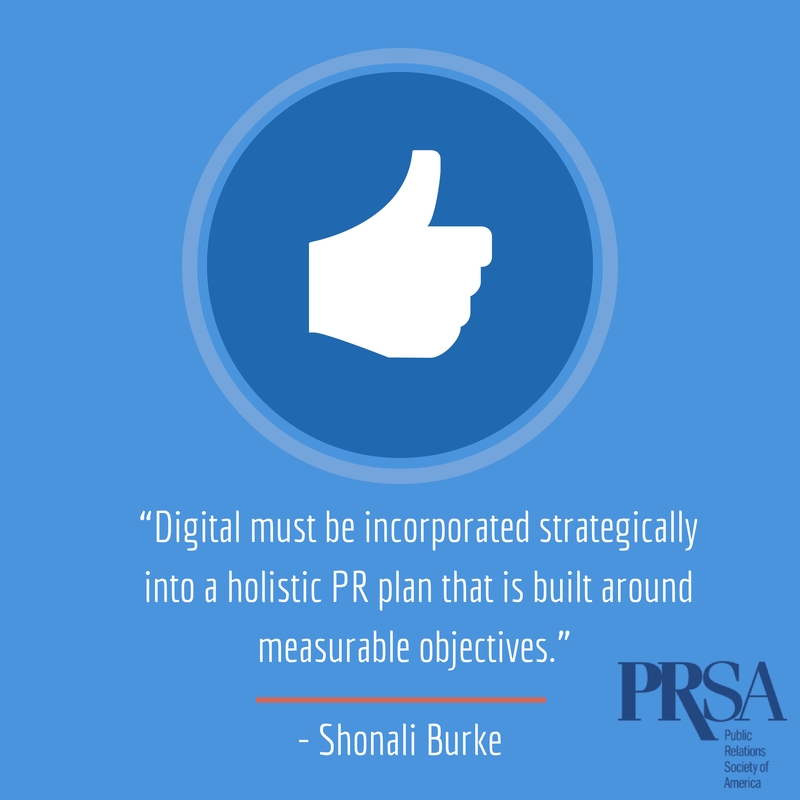If you don’t already know the name Shonali Burke, you should. Among her many distinctions, she was included in PRWeek’s inaugural top “40 Under 40″ list of US-based PR professionals and is considered one of 25 women that rock social media. As President & CEO of Shonali Burke Consulting, Inc. she likes to say that “she helps take business communication strategy from corporate codswallop to community cool™.” The Washington Business Journal also recently named her one of 10 CEOs to follow on Twitter. And if that’s not enough, Burke has also found the time to help develop the next generation of PR pros, holding an Adjunct Faculty position at Johns Hopkins University, where she teaches Public Relations Writing and Communication.org: Not-for-profits in the Digital Age.
On September 12, Burke will be sharing her industry knowledge and hosting a training session focused on communication strategy and social media integration in Chicago, IL. In advance of her event, “Working Smarter in the Ever-Changing Communications Landscape,” we took the opportunity to pick her brain about the changing nature of the PR industry and the tools public relations professionals need to hone in order to stay relevant in the digital age.
Q. What are the three ongoing misconceptions that you’re seeing in terms of PR professionals’ current approach to digital?
SB> First, many PR pros still approach digital as if it’s an “add on.” It’s not. Communication is still communication; digital simply happens to be a newer medium we can use to communicate with our publics.
Second – and this picks up from where the “add on” issue leaves off – digital must be incorporated strategically into a holistic PR plan that is built around measurable objectives. That means rarely, if ever, will it be the *only* element in that plan. Nine times out of 10, it’s not.
Finally, even a PR plan that is primarily digital in approach requires really good and consistent messaging. Many of the pros I see don’t develop key messages and proof points well, and that is a foundational skill they must have, or learn.
Q. Where once a top-tier placement was PR’s primary focus, are you seeing new KPI’s emerge? If so, what?
SB> While our traditional concept of “media” has clearly been up-ended, I still see a lot of excitement over strong media placements in traditional media. And I think that’s a good thing, because top-tier media still hold a level of authority very few other media – including blogs – do.
However, I am starting to see an understanding that KPIs should start moving more towards outcomes, and that’s really great to see. The challenge is that most pros don’t know how to connect all the dots, or they’re browbeaten by their marketing colleagues into thinking sales are the only KPI they should drive. What they should be looking at is how their work ultimately impacts the bottom line, and figuring out correlations accordingly.
Q. Budgets can vary greatly for outsourced social media work. Beyond hourly rates, how can a prospective client assess the value and merits of proposed plans?
SB> Before I answer that, let me tell you what you should expect (or hope) to be asked by an agency, or consultant, or anything in between:
- How your business earns revenue
- How communication (including social media) impacts revenue generation
- Why you want to embark on ____ (this is really important, and any good consultant should ask this!)
- What kinds of assets (including human) and time you’re willing to invest in the partnership
- What “success” means to you (if they don’t ask anything else, they need to know this!)
- If an agency gets a sense of the above from you, then they should be well-poised to present a smart proposal to you that maps out the strategy and explains how all the pieces will work together. We even put these together in suggested timelines, so that clients can really see how the strategy would roll out over time.
Don’t look just for tactical elements (“we’ll manage your Twitter and Facebook accounts”), but ask for examples of the kinds of content they would create and disseminate (story and content ideas, not full-blown writing samples!). Get a sense of who the team is (if it’s more than one person), how they will communicate with you, and how often. Finally, when it comes to how to measure success, make sure this is something you work on with them.
Finally: don’t automatically reach for the lowest bidder; if they can’t explain how they will measure success, then show them the door immediately. Remember that you get what you pay for, and “cheaper” is not always “better” in the long run!
Shonali Burke, ABC, is president and CEO of Shonali Burke Consulting, Inc. Read more about Shonali’s session and register on PRSA.org. Follow her on Twitter @shonali.
Laurent Lawrence is associate director of public relations at the Public Relations Society of America







